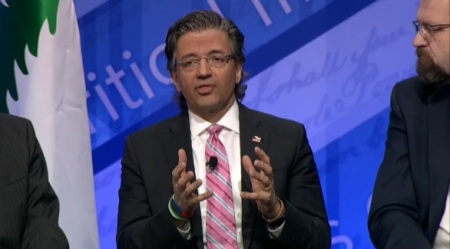Trump Should Add 2 US Allies to Travel Ban List, Says Muslim Reformer

NATIONAL HARBOR, Md. — Prominent Muslim reformer Zuhdi Jasser told the audience at the Conservative Political Action Conference on Friday morning that he would add two United States allies to the group of Muslim-majority countries that were included in President Donald Trump's temporary travel ban.
Jasser, the president of the American Islamic Forum for Democracy and the son of Syrian immigrants who fled as refugees during the 1960s, spoke during a panel discussion called "When Did World War III Begin? Part B: Threats Abroad," which also featured Trump national security advisor Sebastian Gorka and other security experts.
As Trump has received criticism from many on the Left and some on the Right over his Jan. 27 executive order banning immigration from seven Muslim-majority countries for 90 days and banning all refugee resettlement for 120 days, Jasser asserted during the discussion that the order is not a "Muslim ban" and would actually expand the travel ban list to include counties that the U.S. has had strong diplomatic relations with — Pakistan and Saudi Arabia.
The comment came as Jasser claimed that the U.S. government has approached the issue of combatting Islamic extremism in the wrong way.
"We [have] the 'lowest-hanging fruit' syndrome, which is to work with groups that identify as Islamic when, in fact, that is how you identify Islamist movements, which are parties that embrace the collectivism of Islam as a faith, rather than, like we do in the conservative movement, believe in the separation of church and mosque and state and believe in the individual rights of groups rather than leftist, collectivist ideas," Jasser lamented. "That is why there has been this bargain between the Left and Islamists, because they are both collectivists. We see this across the Middle East."
"For too long, as [former Secretary of State] Condoleezza Rice said in Cairo, we have sacrificed security at the expense of democracy and the guise of stability. This mirage of stability that there is no kinetic war between governments has actually made us get in bed with regimes that are fuelling the ideology. It's not a Muslim ban," Jasser continued. "It was basically seven countries. I would add Saudi Arabia, Pakistan, governments that are fueling the ideas that are un-American."
Jasser added, "we should be putting on notice that we will vet people coming in and also groups that we support against Islamist ideas."
"We have to be careful to have a long-term strategy, just like we did in the Cold War. We didn't get in bed with the Italian Communists, the Cuban Communists," Jasser contended. "[We didn't say], 'Oh, because they are anti-Soviet, we are going to work with these Communist Parties.'
"That is our strategy right now when we work with the Saudis, the Pakistanis, etcetera, against the radical Islamists. We need to start having a long-term strategy. Yes, a short-term military one, but long-term ideological strategy for the promotion of freedom. Because, the Arab awakening proved that these populations are ready for a grassroots movement against the establishment across the Middle East, which are these Islamist regimes."
In Saudi Arabia and Pakistan (both Sunni-majority nations), religious minorities (including Muslims) are arrested, imprisoned or killed over their faith or lack of faith as both countries uphold strict blasphemy and apostasy laws. Both countries are listed in the Open Doors USA 2017 World Watch List of countries where Christians are most persecuted. Pakistan ranks at No. 4 on the list, while Saudi Arabia was listed at No. 14.
Jasser contested the idea that those who speak out against the dangers of Islamic radicalism and theocratic Islamic regimes are "Islomaphobes."
"Finally, we have a president in the White House that is willing to identify this Islamic extremism. So, I hope we can shift the access of the approach both domestically and abroad from this nebulous countering of violent extremism to countering violent Islamism," he explained. "Because, in the land of the free, we have to stop the blasphemy-law invocation of this claim of islamophobia and begin to engage Muslims that are jailed across the planet that try to fight against theocratic Islamism, which is the enemy verses Muslims that want to be free and practice their faith free of oppression."
In the discussion, Gorka reminded the audience that the claim that the U.S. and the West are at "war with Islam" is a false notion.
"[Muslims] are on the front line. Remember the ISIS video of the fighter pilot in the cage? I like to tell people that this idea that we are at war with Islam is really fallacious. What's the religion of the guy in the cage who was burned alive?" Gorka asked. "He was not a Baptist, a Hindu or Episcopalian. He was a Jordanian who was being burned alive as a Muslim. Why? Because he disagrees with ISIS. It's the Jordanians, the Egyptians that we have to help defeat ISIS."
Jasser added that it's crucial American Muslims not "get a pass" when it comes to speaking out against theocratic islamism.
"I think it is very important that we not give American Muslims sort of a pass as a minority group in America. We can do things in this country to reform the very ideas that are theoretically inspiring the militants across the planet in this global jihad that you just can't do in Jordan, Saudi Arabia or Iran," Jasser explained.
"Therefore, we need to tell and engage Muslims in America that feel an urgency, that care about the legacy of whether or not their children and grandchildren will be radicalized by this global jihad and whether we want to leave behind an Islam that is at home with American ideas of constitutionalism and freedom or whether it is at home with theocratic ideas. That is a battle that needs to be fought on the frontlines in American media and university platforms."






















